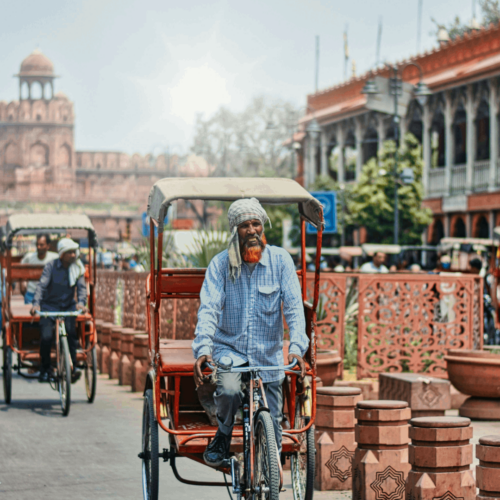At Greaves Tours, we celebrate the confluence of tradition and innovation that defines India’s rich cultural tapestry. In this spirit, we are delighted to introduce Chef Hari Nayak— a visionary who has reimagined Indian cuisine for the global palate.
Hailing from the coastal town of Udupi, Karnataka, Chef Hari’s culinary journey began amidst the aromatic kitchens of his homeland. His passion led him to the esteemed Culinary Institute of America in New York, where he honed his craft under the mentorship of renowned chefs like Daniel Boulud and Marcus Samuelsson. Chef Hari’s illustrious career spans continents, with acclaimed restaurants such as SONA in New York, JHOL in Bangkok, and Baraabaru at the Four Seasons Maldives. His cookbooks, including Modern Indian Cooking and My Indian Kitchen, offer readers a gateway to authentic yet approachable Indian recipes. Through his innovative approach, Chef Hari seamlessly blends traditional Indian flavors with contemporary techniques, inviting diners worldwide to experience the depth and diversity of Indian cuisine.
Ahead of Earth Day, we met with him to ask questions about his sustainable approach to cooking and food. Through his innovative approach, Chef Hari seamlessly blends traditional Indian flavors with contemporary techniques, inviting diners worldwide to experience the depth and diversity of Indian cuisine while embracing a more sustainable future.
How do traditional Indian cooking methods promote sustainability and benefit the environment?

Traditional Indian cooking is inherently sustainable, emphasizing the use of every part of an ingredient and a reliance on plant-based foods. Techniques such as slow-cooking in clay pots, fermenting, and natural preservation methods like pickling minimize the need for artificial additives. By focusing on local, seasonal produce, these practices reduce waste and energy consumption. Additionally, the cultural emphasis on communal meals contributes to less food waste, offering a flavorful and environmentally conscious way of dining.
Can you recommend any Indian eateries that prioritize sustainability in their operations?
Certainly. Two notable establishments come to mind:

• Farmlore, Bengaluru: Situated on a 37-acre working farm, Farmlore offers an immersive farm-to-table experience. Under the guidance of Chef Johnson Ebenezer, the restaurant emphasizes seasonality and sustainability. Ingredients are sourced directly from the surrounding farmland, and cooking is done over mango wood-fired stoves, honoring ancestral techniques. The restaurant’s commitment to sustainable practices has earned it recognition as one of Asia’s 50 Best Restaurants.

• NAAR, Kasauli, Himachal Pradesh: Helmed by Chef Prateek Sadhu, NAAR is a 16- seater destination restaurant nestled in the Himalayan foothills. The establishment celebrates Himalayan cuisine, sourcing ingredients through extensive foraging and research across regions like Ladakh and Arunachal Pradesh. NAAR’s dedication to sustainability is evident in its seasonal menus and its location within a sustainable boutique resort, offering guests an authentic and environmentally conscious dining experience.
What lessons from Indian cooking can travelers incorporate at home to cook more sustainably?
As Chef Hari Nayak continues to inspire the world with his thoughtful blend of heritage and innovation, his story reminds us that every meal is a journey—a connection to culture, community, and the planet. At Greaves Tours, we invite you to experience this culinary legacy firsthand. Whether you’re savoring coastal curries in Karnataka, dining at a Himalayan retreat, or learning to cook traditional dishes with a modern twist, our curated journeys through India celebrate the flavors, stories, and sustainability practices that make the country’s cuisine so extraordinary. Let Greaves Tours craft your next unforgettable travel experience—where every bite tells a story.

Travelers can embrace sustainable Indian cooking practices at home by:
• Utilizing whole ingredients to minimize waste.
• Sourcing local and seasonal produce.
• Focusing on plant-based meals.
• Embracing slow-cooking methods to conserve energy.
• Fermenting and preserving foods, such as pickles and dosa batter.
• Using durable cookware like cast iron.
• Composting food scraps to reduce waste.
These practices not only promote sustainability but also enhance the culinary experience by connecting with time-honored traditions.
As Chef Hari Nayak continues to inspire the world with his thoughtful blend of heritage and innovation, his story reminds us that every meal is a journey—a connection to culture, community, and the planet. At Greaves Tours, we invite you to experience this culinary legacy firsthand. Whether you’re savoring coastal curries in Karnataka, dining at a Himalayan retreat, or learning to cook traditional dishes with a modern twist, our curated journeys through India celebrate the flavors, stories, and sustainability practices that make the country’s cuisine so extraordinary. Let Greaves Tours craft your next unforgettable travel experience—where every bite tells a story.





